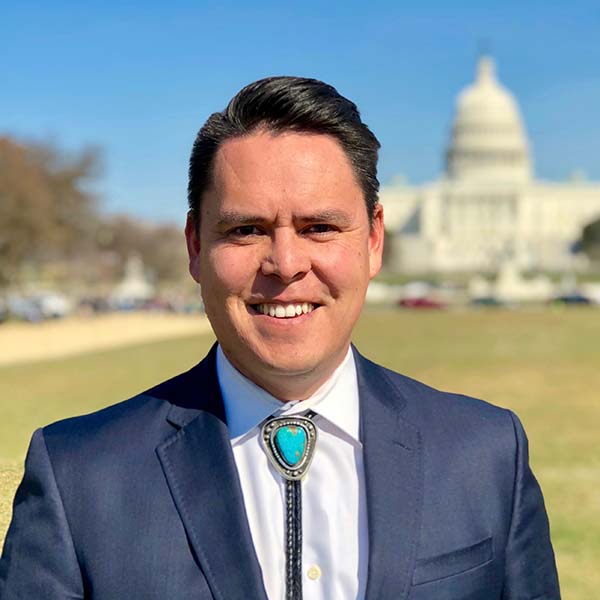WASHINGTON — For the first time in his career, Jackson Brossy finds himself working for the federal government that he had long sought to influence for the betterment of Native American peoples.

The Biden administration tapped the former executive director of the Native CDFI Network to join the Small Business Administration and serve as the assistant administrator in the Office of Native American Affairs.
In that capacity, Brossy will head up a small office with a budget of about $2 million that focuses on increasing the use of the SBA’s loan guarantee program among Native communities, both on and off the reservation, as well as providing technical assistance and training to Native American entrepreneurs. ONAA also administers some small grant programs.
Want more news like this? Get the free weekly newsletter.
A member of the Navajo Nation, Brossy views his new appointment as an extension of the work he’s done at Native CDFI Network to bolster access to capital in Native communities and lift up tribal economies. He also formerly served as executive director of the Washington, D.C. office for Navajo Nation.
“Working with the Native CDFI Network has been incredible and the work that Native CDFIs are doing is very aligned with what I’ve been interested in supporting, and that is increasing economic agency, economic opportunity and ultimately economic power for people that are not born with a lot of benefits and advantages that others are. Especially Native communities like where I’m from, the Navajo Nation,” Brossy told Tribal Business News. “That’s what’s brought me to places like Native CDFI Network and that’s what brought me to the Small Business Administration as the head of Native American Affairs.
“I’m also here because I believe there’s opportunities to do well and to do good in this time frame. … I think that the administration does want to increase opportunity for Native people.”
As Brossy looks around the federal government, he’s encouraged by the number of Native American appointees in all levels of the bureaucracy, from his counterparts in Native American affairs offices in other departments all the way up to Interior Secretary Deb Haaland.
“It feels good to have the federal government interested in hearing, hiring and having someone on their side of the table who comes from (my) background,” he said. “I’m really encouraged about this and really excited about the opportunities moving forward.”
Moreover, having grown up on the Navajo Nation frames how Brossy views the challenges that Native-owned small businesses face, and what the dearth of Native-owned enterprises means for those communities.
“Where I grew up, people drive an hour each way to buy groceries in external communities that don’t return taxes (to the reservation). Like a lot of Indian Country, people spend a lot of money off the reservation and don’t get much back,” he said.
News of Brossy joining the SBA earned a warm reaction from Indian County.
Heather Fleming, executive director of Tuba City, Ariz.-based Change Labs, a Native small business incubator, called Brossy’s appointment “exciting news for Native communities.” Brossy also serves as a member of the board for Change Labs.
“For too long, the SBA has been largely irrelevant in my community due to distance, lack of cultural connection, and so on,” Fleming said in an email to Tribal Business News. “I feel hopeful knowing that Jackson grew up in the same place where my grandparents used to herd their livestock. He knows the challenges, he knows our people, and he’s motivated to build Native economies.”
National Center for American Indian Enterprise Development President and CEO Chris James, who served at ONAA for a time during the Obama administration, wished Brossy well in the new role.
“Jackson has shown commitment to tribal government, tribal enterprises, access to capital, and small business,” James said in an email. “The NCAIED looks forward to working with Jackson as SBA continues to provide resources to our communities.”
James also has been a staunch advocate for bipartisan legislation that would strengthen and increase funding for the ONAA, as well as create a new Associate Administrator position that would report directly to the SBA administrator, as Tribal Business News previously reported. ONAA’s budget has slipped from a peak of $5 million in the 1990s to around $2 million currently.
Meanwhile at the Native CDFI Network, board chairman Pete Upton, the executive director of Grand Island, Neb.-based Native360 Loan Fund Inc., will lead the organization in an interim capacity.
“The NCN Board appreciates Mr. Brossy’s work as Native CDFIs have continued to grow and mature during his time as Executive Director. We wish him the very best as he starts this new role,” Upton said in a statement. “The NCN Board has over 75 years of combined experience within the industry. With our combination of experiences and qualifications, I feel confident that the Board and I will continue to take the organization and NCDFI movement to new heights in 2022.”
